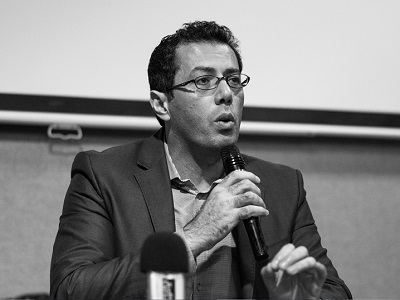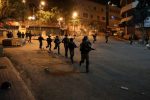Rim Banna a famous Palestinian singer who translated Palestine’s most moving poetry to song passed away on March 24 2018 at the age of 51. Rim captured the struggle for Palestinian freedom in the most dignified and melodious ways. If we could imagine angels singing they would sound like Rim.
When Rim died all Palestinians mourned her death. Although a few international outlets carried the news of her passing at a relatively young age her succumbing to cancer did not receive much coverage or discussion. Sadly a Palestinian icon of cultural resistance who had inspired a whole generation starting with the First Palestinian Intifada in 1987 hardly registered as an event worthy of remembrance and reflection even among those who purport to champion the Palestinian cause.
Compare Rim to Madonna an ‘artiste’ who has stood for self-aggrandising personal fame and money-making. She has championed the most debased moral values utilising cheap entertainment while catering to the lowest common denominator to remain relevant in the music world for as long as possible.
While Rim had a cause Madonna has none. And while Rim symbolised cultural resistance Madonna symbolises globalised cultural hegemony – in this case the imposition of consumerist western cultures on the rest of the world.
Cultural hegemony defines the US and other Western cultures’ relationship to the rest of the world. It is not culture as in the collective intellectual and artistic achievements of these societies but as a set of ideological and cultural tools used by ruling classes to maintain domination over the disadvantaged colonised and oppressed.
Madonna along with Michael Jordan the Beatles and Coca Cola represent far more than mere performers and fizzy drinks but also serve as tools used to secure cultural thus economic and political dominance as well. The fact that in some cities around the world especially in the Southern hemisphere Coca Cola “flows more freely than water” speaks volumes about the economic toll and political dimension of cultural hegemony.
This issue becomes critical when a pro-Israel Madonna decides to perform in Israel as she has done repeatedly in the past as part of the Eurovision contest. Knowing who she is and what she stands for her decision should not come as a surprise; after all in her September 2009 Tel Aviv concert she sang while wrapped in an Israeli flag.
Of course it is essential that artists of her calibre and the contestants representing 41 different countries are reminded of their moral responsibilities towards occupied and oppressed Palestinians. It is also important that Israel is confronted regarding its unrelenting efforts to mask its apartheid and war crimes in Palestine.
Indeed the whitewashing of Israeli human rights violations using art – also known as “art washing” – should not be allowed to continue when Gaza is under siege where Palestinian children are shot and killed daily without remorse and the least legal accountability.
This is why such artistic events are essential for the Israeli government and society. Israel has used Eurovision as a distraction from the blood and gore that has been taking place not far from that venue. Those who laboured to ensure the success of the event knowing fully how Israel is using the brand as an opportunity to normalise its war against Palestinians should be thoroughly ashamed of themselves.
But on the other hand should we be the least surprised? Aren’t such global music events as Eurovision at the heart of the western-centric globalisation scheme of cultural hegemony which sole purpose is to enforce a capitalist view of the world where western culture is consumed as a commodity no different from a McDonald’s sandwich or a pair of Levi jeans?
Calling on 60-year-old Madonna to refrain from entertaining apartheid Israel can be considered beneficial as a media strategy for it helped highlight although momentarily an issue that would have been otherwise absent from news headlines. However by placing so much focus on Madonna and whatever human rights’ values she supposedly stands for we also take the risk of inadvertently validating her and the consumerist values she represents. More in this Madonna-driven trajectory we are also neglecting Palestine’s cultural resistance the core driver behind Palestinian ‘somoud’ – steadfastness – over a century.
In response to her critics Madonna answered “I’ll never stop playing music to suit someone’s political agenda nor will I stop speaking out against violations of human rights wherever in the world they may be.” In the eyes of many who are ignorant of the facts such an answer may appear as if an ‘empowered’ response to those who are trying to sway a genuine pure artiste from following her calling.
Madonna is an expert in appearing as if morally-guided yet never translating such morality to anything meaningful in reality. In a speech described as “powerful” by the Rolling Stone Magazine Madonna declared during a Women’s March in Washington D.C. in 2017 “to the rebellion to our refusal as women to accept this new age of tyranny. Where not just women are in danger but all marginalised people.”
Of course Palestinian Lebanese and Syrian women – who have paid a heavy price for Israeli Occupation war and marginalisation – are not to be included in Madonna’s false revolution. And the chances are shortly after she sings and dances in a jubilant apartheid Israel she will once more take on many platforms as if the Rosa Parks of revolutionary art.
While it is essential that we keep the pressure on those who engage and validate Israel politically economically and culturally these efforts should come secondary to embracing Palestine’s culture of resistance. Behaving as if Madonna’s stage shenanigans represent right culture while ignoring Palestinian culture altogether is similar to academics addressing decolonisation from the point of view of the coloniser not the colonised. The truth is nations cannot truly rid themselves from the colonial mindset without having their narratives take the centre-stage of politics culture and every other aspect of knowledge.
“The intellectual’s error consists in believing that one can know without understanding and even more without feeling and being impassioned” wrote Italian anti-fascist intellectual Antonio Gramsci. This entails the intellectual and the artist to feel “the elementary passions of the people understanding them and therefore explaining and justifying them.”
The truth is that appealing to Madonna’s moral sense without immersing ourselves passionately in the art of Rim Banna will in the long run do Palestinians no good. Only embracing Palestine’s culture of resistance will ultimately keep the self-serving hegemonic and cheap cultural messages of the Madonnas of this world at bay.
– Ramzy Baroud is a journalist author and editor of Palestine Chronicle. He has authored a number of books on the Palestinian struggle including ‘The Last Earth: A Palestinian Story’. Baroud has a Ph.D. in Palestine Studies from the University of Exeter and is a Non-Resident Scholar at Orfalea Centre for Global and International Studies University of California Santa Barbara.











